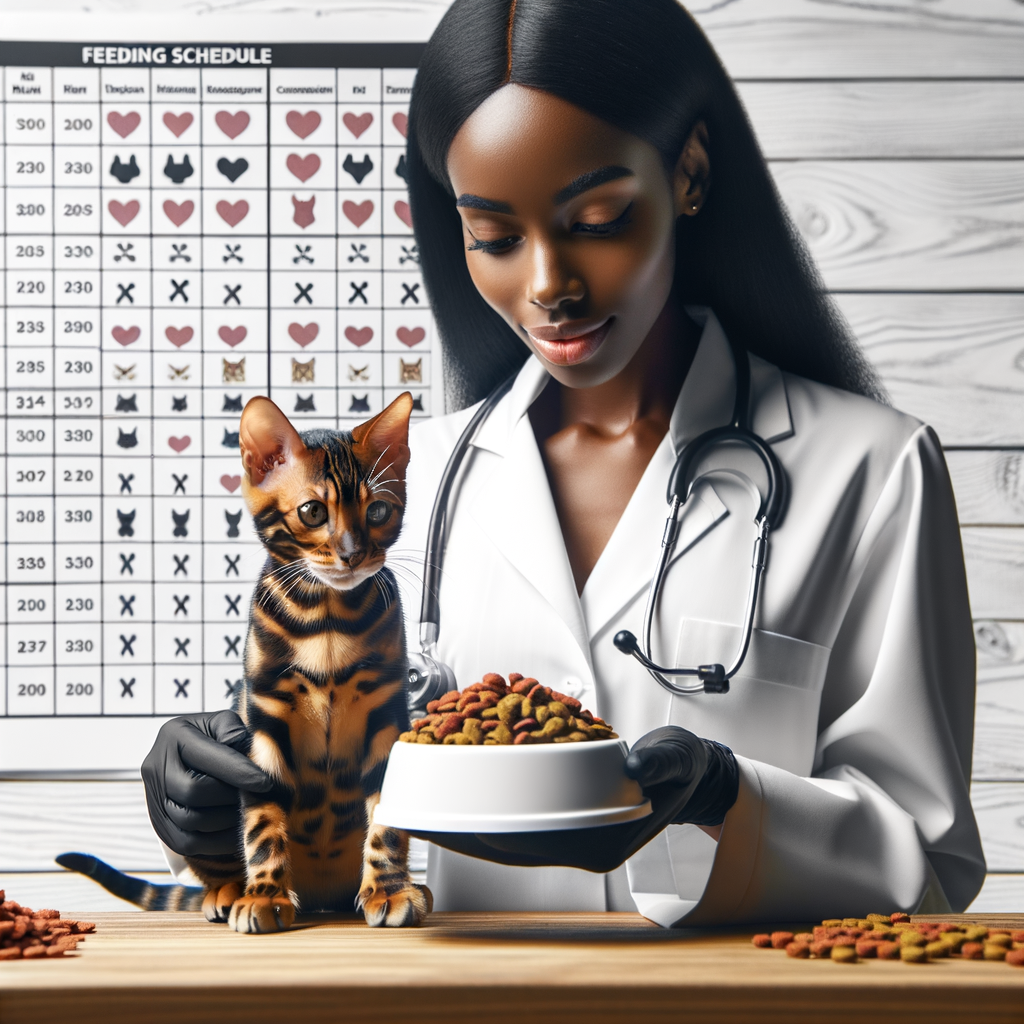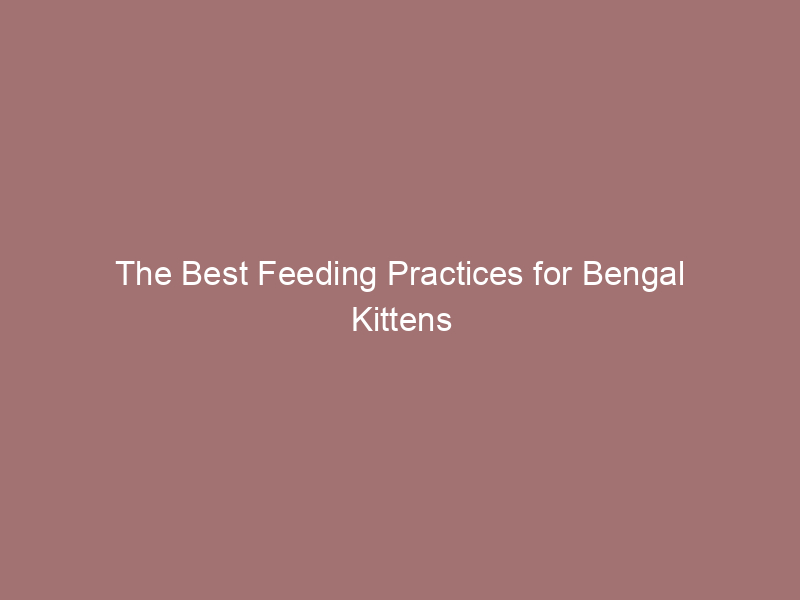
The Best Feeding Practices for Bengal Kittens: An Overview
- Importance of a balanced Bengal kitten diet: It helps them grow strong and healthy. A good diet includes proteins, fats, vitamins, and minerals. Without a balanced diet, kittens can face health issues.
- Bengal kitten nutrition needs: Bengal kittens have specific nutrition needs. They need more protein than adult cats. This is because they are growing quickly. Make sure their food has high-quality protein sources like chicken or fish.
- Feeding schedule for Bengal kittens: Bengal kittens should eat 3-4 times a day. This helps them get enough nutrients throughout the day. As they grow older, you can reduce the number of meals.
Understanding Bengal Kitten Nutrition
Essential Nutrients for Bengal Kittens
Feeding your Bengal kitten the right nutrients is key to their growth and health. Let’s explore the essential nutrients they need.
- Proteins and why they are crucial: Proteins are the building blocks of your kitten’s body. They help in muscle growth and repair. Bengal kittens are very active, so they need a lot of protein. Look for foods that list meat as the first ingredient.
- The importance of fats in a Bengal kitten’s diet: Fats provide energy and help with brain development. They also keep your kitten’s coat shiny and healthy. Make sure their diet includes healthy fats like omega-3 and omega-6 fatty acids.
- Vitamins and minerals: What to include: Vitamins and minerals are essential for overall health. Vitamins like A, D, E, and K support vision, bone growth, and immune function. Minerals such as calcium and phosphorus are important for strong bones and teeth. Ensure their food contains a balanced mix of these nutrients.
| Essential Nutrient | Importance | Sources |
|---|---|---|
| Proteins | Muscle growth and repair | Meat, fish, eggs |
| Fats | Energy, brain development, healthy coat | Fish oil, chicken fat, flaxseed |
| Vitamins | Vision, bone growth, immune function | Fruits, vegetables, liver |
| Minerals | Strong bones and teeth | Bone meal, fish, leafy greens |
Special Nutritional Needs of Bengal Kittens
-
The Growth Phase
Bengal kittens grow quickly in their first year. During this time, they need more nutrients than adult cats. This phase is crucial for their development.
For example, a Bengal kitten’s weight can double in just a few weeks. They need a diet rich in proteins and fats to support this rapid growth. According to Wikipedia, kittens require about twice the protein that adult cats do.
-
Addressing the Energy Needs of Active Bengal Kittens
Bengal kittens are very active. They love to play and explore. This high energy level means they need more calories than less active kittens.
To meet these needs, choose foods that are high in calories and nutrients. Look for kitten food with a balance of proteins, fats, and carbohydrates. This will help them stay energetic and healthy.
-
Supporting Bone and Muscle Development
Calcium and phosphorus are key minerals for bone health. Proteins are vital for muscle growth.
Ensure their diet includes these nutrients. Foods with added vitamins and minerals can also support overall health. For example, vitamin D helps with calcium absorption, which is important for bone strength.
Nutrient Importance Protein Muscle growth and repair Calcium Bone development Phosphorus Bone and teeth health Vitamin D Calcium absorption
Best Food for Bengal Kittens
Commercially Prepared Foods
- Benefits of dry food
Dry food is convenient and helps keep your Bengal kitten’s teeth clean. It is easy to store and has a longer shelf life. Dry food also helps in reducing plaque buildup.
- Advantages of wet food
Wet food is great for hydration. Bengal kittens often don’t drink enough water, so wet food helps them stay hydrated. It is also more palatable and can be easier to digest.
- Bengal kitten food recommendations
When choosing food for your Bengal kitten, look for high-quality brands that list meat as the first ingredient. Some recommended brands include:
| Food Type | Benefits |
|---|---|
| Dry Food | Convenient, helps clean teeth, long shelf life |
| Wet Food | Hydrates, palatable, easy to digest |
Homemade Food for Bengal Kittens
-
Benefits and Drawbacks
Feeding your Bengal kitten homemade food can be rewarding. Here are some benefits and drawbacks:
Benefits Drawbacks Control over ingredients Time-consuming to prepare Can be tailored to your kitten’s needs Requires knowledge of kitten nutrition No preservatives or fillers May be more expensive -
Key Ingredients to Include
- Protein: Chicken, turkey, or fish are excellent sources.
- Fats: Essential for energy; use fish oil or chicken fat.
- Vitamins and Minerals: Add supplements to ensure a balanced diet.
- Carbohydrates: Small amounts of rice or sweet potatoes.
-
Sample Bengal Kitten Meal Plan
Here’s a simple meal plan for a Bengal kitten:
Meal Ingredients Breakfast Boiled chicken, a small amount of rice, and fish oil Lunch Cooked turkey, sweet potatoes, and a vitamin supplement Dinner Grilled fish, a small amount of rice, and chicken fat Always consult with your vet before making any changes to your kitten’s diet.
Feeding Schedule for Bengal Kittens
Feeding Frequency
- How often to feed Bengal kittens:
Bengal kittens need to eat more frequently than adult cats. Typically, you should feed your Bengal kitten 3 to 4 times a day. This helps them get the energy they need to grow and play. For example, you can feed them in the morning, at noon, in the afternoon, and in the evening. - Adjusting the feeding schedule as your kitten grows:
As your Bengal kitten gets older, you can start to reduce the number of feedings. By the time they are about 6 months old, you can switch to feeding them 2 to 3 times a day. This gradual change helps them adjust to eating less often while still getting the nutrients they need.
| Age of Kitten | Feedings Per Day |
|---|---|
| 0-3 months | 4 times |
| 3-6 months | 3 times |
| 6+ months | 2-3 times |
Portion Sizes
-
Portion Sizes for Bengal Kittens
Bengal kittens are active and need enough food to grow strong. But, giving them too much can lead to problems.
Here are some tips to help you:
- Age Matters: Younger kittens need smaller, more frequent meals. As they grow, the portion size can increase.
- Weight: A kitten’s weight can help decide the right portion. A good rule is to feed them about 5% of their body weight.
- Activity Level: Active kittens may need a bit more food. But, be careful not to overfeed.
Age Portion Size Frequency 0-3 months 1-2 tablespoons per meal 4-5 times a day 3-6 months 2-4 tablespoons per meal 3-4 times a day 6-12 months 4-6 tablespoons per meal 2-3 times a day -
How to Avoid Overfeeding
Overfeeding can make your kitten gain too much weight. This can lead to health problems. Here are some ways to avoid overfeeding:
- Measure Food: Use a measuring cup to give the right amount of food.
- Stick to a Schedule: Feed your kitten at the same times every day.
- Watch Their Weight: Check your kitten’s weight regularly. If they are gaining too much, cut back a little on food.
- Avoid Treats: Treats can add extra calories. Give them only on special occasions.
By following these tips, you can help your Bengal kitten stay healthy and happy.
Maintaining a Healthy Diet for Bengal Kittens
Monitoring Your Kitten’s Health
- Signs of a healthy diet:
- Shiny, smooth coat
- Bright, clear eyes
- Playful and active behavior
- Steady weight gain
- Regular bowel movements
- Warning signs of nutritional deficiencies:
- Dull or brittle coat
- Frequent diarrhea or constipation
- Lethargy or lack of energy
- Slow growth or weight loss
- Frequent infections or illnesses
| Healthy Diet Signs | Nutritional Deficiency Signs |
|---|---|
| Shiny, smooth coat | Dull or brittle coat |
| Bright, clear eyes | Frequent diarrhea or constipation |
| Playful and active behavior | Lethargy or lack of energy |
| Steady weight gain | Slow growth or weight loss |
| Regular bowel movements | Frequent infections or illnesses |
Regular Vet Check-ups
- The role of vet check-ups in maintaining a healthy diet: During these visits, the vet will check your kitten’s weight, growth, and overall health. They can spot any early signs of health issues and give advice on the best diet for your kitten. This helps ensure your kitten gets the right nutrients to grow strong and healthy.For example, if your kitten is gaining too much weight, the vet might suggest a lower-calorie food. If your kitten is underweight, they might recommend a more nutrient-dense diet. Regular check-ups help catch these issues early, so your kitten stays on the right track.
- What to expect during a vet visit: During a vet visit, the vet will do a thorough check-up of your Bengal kitten. This usually includes:
- Weighing your kitten
- Checking their teeth and gums
- Listening to their heart and lungs
- Examining their coat and skin
- Discussing their diet and eating habits
The vet might also give your kitten vaccines and check for parasites. They will ask about your kitten’s diet and may give tips on how to improve it. This is a great time to ask any questions you have about your kitten’s health and diet.
Ensuring Proper Nutrition for Bengal Kittens
- Recap of Best Feeding Practices: Bengal kittens need a diet rich in protein and healthy fats. Wet food is often better than dry food because it contains more moisture. Always check the ingredients list to avoid fillers and artificial additives. Fresh water should be available at all times.
- Importance of Consistency in Feeding: Keeping a regular feeding schedule is crucial. It helps your kitten develop a routine and ensures they get the right amount of nutrients. Consistency in the type of food you provide also helps prevent digestive issues.
- Final Thoughts on Bengal Kitten Feeding Guide: Proper nutrition is key to your Bengal kitten’s health and growth. By following the best feeding practices and maintaining consistency, you can help your kitten thrive. Always consult your vet for personalized advice.
| Key Points | Details |
|---|---|
| Best Food | High in protein, low in fillers |
| Feeding Schedule | Regular and consistent |
| Water | Always fresh and available |






